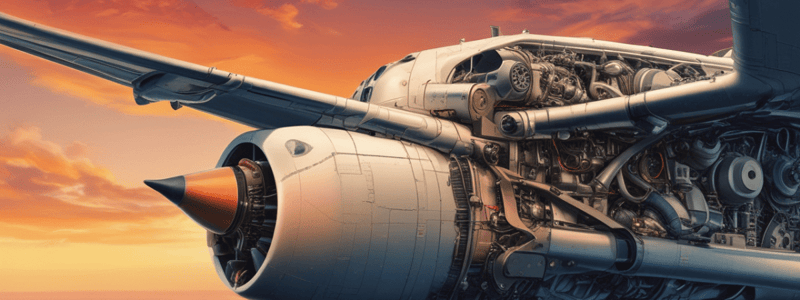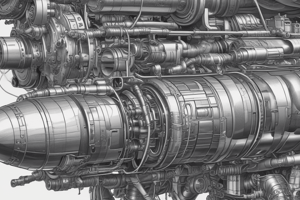Podcast
Questions and Answers
What primary function does the oil film serve between gears in an engine?
What primary function does the oil film serve between gears in an engine?
- It increases friction.
- It cushions contact. (correct)
- It enhances thermal conductivity.
- It provides electrical insulation.
How does oil contribute to engine cleaning?
How does oil contribute to engine cleaning?
- It evaporates moisture.
- It reacts chemically with contaminants.
- It picks up foreign particles and suspends them. (correct)
- It attracts carbon deposits.
What role does the oil film play in corrosion protection?
What role does the oil film play in corrosion protection?
- It serves as a barrier against moisture and oxygen. (correct)
- It neutralizes acidic compounds.
- It enhances surface roughness.
- It strengthens metal components.
Why are synthetic lubricants preferred in gas turbine engines?
Why are synthetic lubricants preferred in gas turbine engines?
What is a potential consequence of using petroleum lubricants in high-temperature engine operations?
What is a potential consequence of using petroleum lubricants in high-temperature engine operations?
What type of engine parts are especially prone to corrosion when exposed to moisture and chemicals?
What type of engine parts are especially prone to corrosion when exposed to moisture and chemicals?
What does the oil do with foreign particles as it circulates through the engine?
What does the oil do with foreign particles as it circulates through the engine?
Which characteristic of synthetic oil contributes to reducing coking and lacquer formation in engines?
Which characteristic of synthetic oil contributes to reducing coking and lacquer formation in engines?
What is high film strength primarily required for?
What is high film strength primarily required for?
How can high film strength be physically demonstrated?
How can high film strength be physically demonstrated?
What does a high flash point indicate about the oil?
What does a high flash point indicate about the oil?
What is viscosity a measure of in lubricating oil?
What is viscosity a measure of in lubricating oil?
Why is it important for oil to have both low viscosity and high film strength?
Why is it important for oil to have both low viscosity and high film strength?
Which statement about low viscosity oil is correct?
Which statement about low viscosity oil is correct?
For synthetic oils used in gas turbine engines, what is the typical flash point?
For synthetic oils used in gas turbine engines, what is the typical flash point?
What is the primary challenge in achieving optimal oil performance?
What is the primary challenge in achieving optimal oil performance?
What is one of the primary purposes of lubricating oil in aircraft engines?
What is one of the primary purposes of lubricating oil in aircraft engines?
Which manual provides the correct oil specifications for a specific engine type?
Which manual provides the correct oil specifications for a specific engine type?
What could result from mixing oils with different specifications?
What could result from mixing oils with different specifications?
How does lubrication oil assist in the cooling of engine bearings?
How does lubrication oil assist in the cooling of engine bearings?
Why are liquid lubricants like oils predominantly used in aircraft engines?
Why are liquid lubricants like oils predominantly used in aircraft engines?
What additional function does lubricating oil provide apart from reducing friction?
What additional function does lubricating oil provide apart from reducing friction?
What happens to engine parts when they rub against one another without lubrication?
What happens to engine parts when they rub against one another without lubrication?
What is an important characteristic of engine parts that affects lubrication?
What is an important characteristic of engine parts that affects lubrication?
What is a major advantage of high volatile fuels?
What is a major advantage of high volatile fuels?
What does a high vapour pressure indicate?
What does a high vapour pressure indicate?
What temperature is associated with a fuel's flash point?
What temperature is associated with a fuel's flash point?
What is the primary purpose of the NACA scoop under the wings of an aircraft?
What is the primary purpose of the NACA scoop under the wings of an aircraft?
What can happen if the vapour pressure of fuel is too low?
What can happen if the vapour pressure of fuel is too low?
Which of the following is a disadvantage of high volatile fuels?
Which of the following is a disadvantage of high volatile fuels?
What is the impact of fast climbs on fuel vapourisation?
What is the impact of fast climbs on fuel vapourisation?
Why are modern fuels designed to be less volatile?
Why are modern fuels designed to be less volatile?
What form of water in aviation turbine fuel cannot be detected visually?
What form of water in aviation turbine fuel cannot be detected visually?
Where does free water typically settle in the aircraft's fuel system?
Where does free water typically settle in the aircraft's fuel system?
Which method is NOT typically used to check for water contamination in aircraft fuel?
Which method is NOT typically used to check for water contamination in aircraft fuel?
What happens to free water in sufficient quantities in aviation fuel?
What happens to free water in sufficient quantities in aviation fuel?
What color does the water finding paste turn when it detects water present?
What color does the water finding paste turn when it detects water present?
What type of water is referred to as being 'entrained' or 'suspended'?
What type of water is referred to as being 'entrained' or 'suspended'?
How often are aircraft fuel tanks checked before the first flight of the day?
How often are aircraft fuel tanks checked before the first flight of the day?
Why is water contamination a concern for aviation turbine fuel?
Why is water contamination a concern for aviation turbine fuel?
Flashcards are hidden until you start studying
Study Notes
Aircraft Engine Oils
- Oil types have varying properties and characteristics; correct specification is crucial to prevent engine failure.
- Oil specifications can be found in the Aircraft Operator’s Manual, Maintenance Manual, Engine Maintenance Manual, and oil tank service placard.
- Mixing oils of different specifications or brands is prohibited.
Lubrication
- The primary role of lubricants is to reduce friction between moving parts and cool engine bearings.
- Lubricants also cushion components, seal gaps, clean engine interiors, and protect against corrosion.
- Liquid lubricants, particularly oil, are most commonly used due to their ability to circulate freely.
- Engine parts have rough surfaces microscopically, which can cause wear; oil films reduce this friction.
Cleaning
- Lubricating oil serves as a cleaning agent, picking up particles like dirt, carbon, and water.
- These particles are held in suspension and transferred to a filter for removal, helping to reduce engine wear.
Corrosion Protection
- Engine parts exposed to moisture and chemicals are at risk of corrosion, particularly hardened parts.
- Oil creates a barrier that prevents oxygen and moisture contact with metal surfaces, mitigating rust and corrosion.
Synthetic Oil Characteristics
- High operational temperatures necessitate synthetics that can withstand conditions that cause petroleum oils to evaporate.
- Synthetic oils resist breakdown, coking, and lacquer formation, making them ideal for turbine engines.
- High film strength in oil is crucial to maintain a protective layer between moving parts, observable by a slick feel when rubbed.
Flash Point
- Flash point is the temperature at which oil emits flammable vapors; higher flash points reduce fire risks.
- Synthetic oils for gas turbine engines typically have flash points above 250 °C.
Viscosity
- Viscosity indicates oil's flow resistance; it must be light enough for circulation but thick enough to form a lubricating film.
- Low viscosity oils flow freely, while high viscosity oils flow slowly.
Fuel Volatility
- High volatile fuels enhance combustion and starting but pose fire hazards and vapor lock risks.
- Key factors include flash point and vapour pressure, which influence ignition and vaporization risks.
Vapour Pressure
- Vapour pressure prevents fuel from vaporizing; NACA scoops create pressure in fuel tanks to aid in this.
- Low vapour pressure can lead to starting issues as fuel may not vaporize effectively.
Water Contamination of Fuel
- Aviation fuel is hygroscopic, meaning water is always present from condensation.
- Water exists in dissolved form (invisible) and free form (suspended), with free water posing operational threats like ice formation.
- Regular checks for free water are necessary using fuel drain valves, detection caps, or water finding paste.
Studying That Suits You
Use AI to generate personalized quizzes and flashcards to suit your learning preferences.




